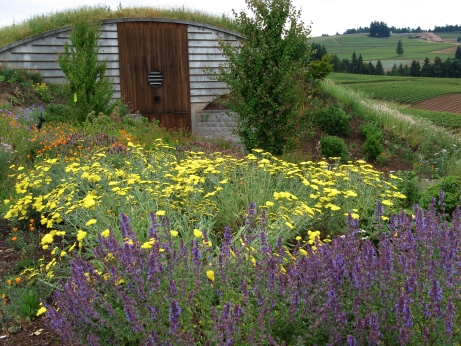Traveling through one corner of Oregon’s wine country taught me a lot about sustainable wine production. Here’s a quick guide to the green certifications for wines:

King Estate organic wines
Organic: Most certified-organic wine labels say “made with organic grapes,” which means at least 70 percent of the wine’s ingredients are grown without synthetic fertilizers or pesticides. The wine maker may also add low levels of sulfite as a preservative.
Biodynamic: The Demeter organization certifies that grapes are grown without synthetic pesticides or fertilizers and that the farm is managed as a living organism with a healthy, diverse ecosystem.
LIVE (Low-Input Viticulture and Enology): This internationally recognized program for sustainable certification limits use of chemical pesticides and promotes species appropriate to local conditions, biodiversity, and reliance on beneficial insects and plants.
Salmon Safe: A U.S. Northwest eco-label for agricultural practices that protect and restore waterways, allowing salmon to spawn and thrive. This certification comes with LIVE certification.
Here’s a taste of a few of the sustainable vintners in Oregon who are helping make a difference for the earth.
- Amity Vineyards: LIVE, some organic
- Argyle Winery: LIVE, Salmon Safe
- Apolloni Vineyards: LIVE, Salmon Safe
- Brick House Vineyards: organic, biodynamic
- Cooper Mountain Vineyards: organic, biodynamic
- Evesham Wood: organic
- King Estate: organic
- Montinore Estate: organic, biodynamic
- Patton Valley Vineyards: LIVE, Salmon Safe
- Ponzi Vineyards: LIVE, Salmon Safe
- Sokol Blosser Winery: organic, LIVE, Salmon Safe with a LEED-certified barrel cellar
- Stoller Vineyard: LIVE, Salmon Safe, LEED-certified vineyard.
- Van Duzer Vineyards: LIVE, Salmon Safe
- Willamette Valley Vineyards: organic, LIVE, Salmon Safe
- Winter’s Hill: LIVE, Salmon Safe
If you know of other sustainable Oregon wineries that I should add to this list, please leave a comment at the end of this blog about its name and what green certifications it carries.
—Laurel Kallenbach, writer and editor

Sokol Blosser’s wine cellar is built into the side of a hill.
